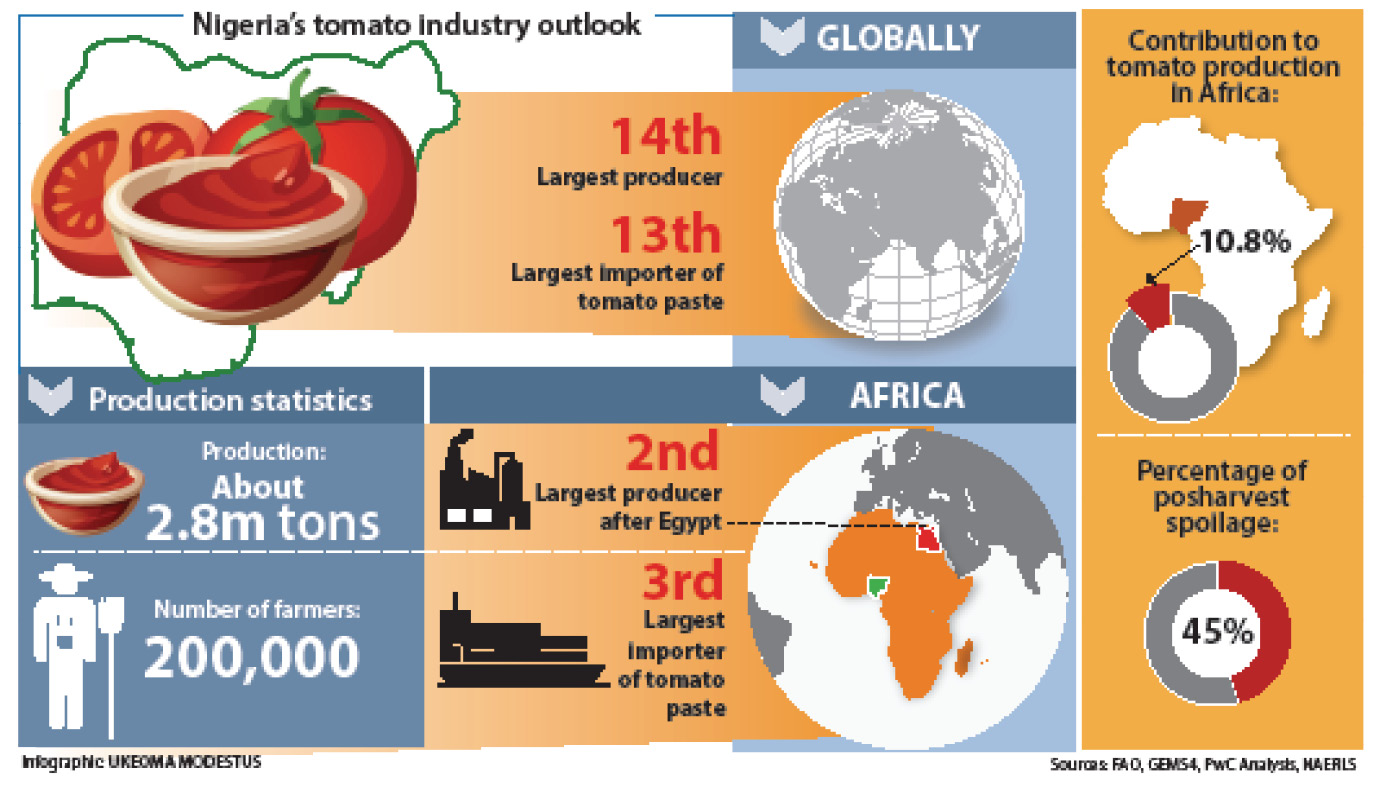Why FG’s new tomato policy not yielding results
When it comes to tomato, there is so much to say about Nigeria. Most of the statistics point to something wrong in the industry: high postharvest spoilage, poor harvest and storage infrastructure, poor rain-fed production, high paste import figures and so on. Since 2013, the Central Bank of Nigeria, in collaboration with the Federal Ministry […]

Why FG’s new tomato policy not yielding results
When it comes to tomato, there is so much to say about Nigeria. Most of the statistics point to something wrong in the industry: high postharvest spoilage, poor harvest and storage infrastructure, poor rain-fed production, high paste import figures and so on.
Since 2013, the Central Bank of Nigeria, in collaboration with the Federal Ministry of Agriculture and Rural Development and that of Industry, Trade and Investment, has held several summits and/or made several policy statements on tomato.
Late last year, the Federal Executive Council came up with another policy that hopes to be the game changer and perhaps make smallholder farmers richer.
But the policy was already generating negative reaction from countries that will not even open their doors to our agricultural goods.
The EPA Monitor warned two months ago that: “the new trade measures in support of the local tomato sector would likely fall foul of the provisions of the EU-West Africa economic partnership agreement related to tariff standstill commitments and the ‘prohibition of quantitative restrictions.’
New Policy, a new problem
National President of the Tomato Growers Association of Nigeria (TOGAN), Alhaji Abdullahi Ringim, painted a picture of the new policy and the new the problem that evolved.
He said the Federal Executive Council approval that no forex should be allocated to any importer of tomato paste because what they were doing was to access forex exchange at N305 to a dollar but they will import the paste and cost it at N360 before adding other costs thereby making billions. With the government’s new policy, importers of paste will now access dollar at N360.
The FEC also increased the import duty from 5% to 50%, which was meant to encourage processors to source their fresh tomatoes locally.
In addition, government also imposed a levy of $1,500 per metric tonne imported. The idea is not to place outright ban because of its signatory to the World Trade Organization (WTO).
However, observers said since the policy was introduced, smuggling activities heightened and the importers, too, have devised new ways of bringing in tomato paste as the product is everywhere.
Big importers now use small individual importers who cannot be traced to them to do the dirty job.
Alhaji Ringim urged the relevant government agencies to tighten surveillance at the borders or go to the warehouses where these imported pastes are stored for a check.
Production challenges still overwhelming
Despite huge potentials, the mounting challenges of tomato production in Nigeria have not been solved.
Kano State Chairman of Tomato Out Growers Association of Nigeria (TOGAN), Alhaji Sani Danladi Yadakwari, lamented that for ages, tomato farmers have been facing the same difficulties in terms of production, processing and storing the produce.
The absence of improved seed varieties for long shelf life, good extension services, cold rooms/vehicles and disease have added to the farmers’ pains.
Smallholder farmers get little
Post-harvest losses have been synonymous to tomato farming in Nigeria with available statistics showing that farmers lose between 40 to 45 per cent of their harvest.
Onokala Amarachi, a former manager of Scot Farms, Uromi, Edo State, called the situation pathetic and killing, especially at the peak of production during the dry season when glut hit farmers.
The greenhouse farmer has since gone out of production due to these challenges.
Similarly, Alhaji Yadakwari in Kano, stressed how pathetic it is in most tomato producing states to see tomatoes being dried by the roadside, which unfortunately happens to be the only alternative for tomato farmers to reduce the avoidable post-harvest losses.
While farmers groan under the unfortunate situation, marketers who could afford to buy tomato and transport to Lagos or other southern states get the profit; the farmers get about 10% of the value of what they produce.
Will big players help smallholder farmers?
The Central Bank Governor, Godwin Emefiele, said the apex bank’s involvement in the tomato industry was about N10bn, covering eight projects one of which is the Dangote Green House tomato project, which can produce 10 million tomato seedlings in a month for the 5,000 outgrowers at Kadawa irrigation valley where the factory is located.
If that has to happen, smuggling activities and import restriction implementation must be intensified.
Yadakwari said, “If the up-taker company will produce and yet no one patronizes the tomato paste it produces, definitely, all the government’s efforts and that of the farmers will be wasted and the end result will be the closure of such companies which will definitely take the whole processes backward.”
ABP may help
The Central Bank of Nigeria’s Anchor Borrowers Programme and the right seed that produce quality puree might encourage processors and investors to come but the Federal Government must first strengthen all the weak areas that many take advantage of.
The Federal Ministry of Agriculture, however, said it is working hard to reposition the industry – something they have said for over a decade now.
A director who wouldn’t want to be mentioned said they are working tirelessly in the area of postharvest loss.
